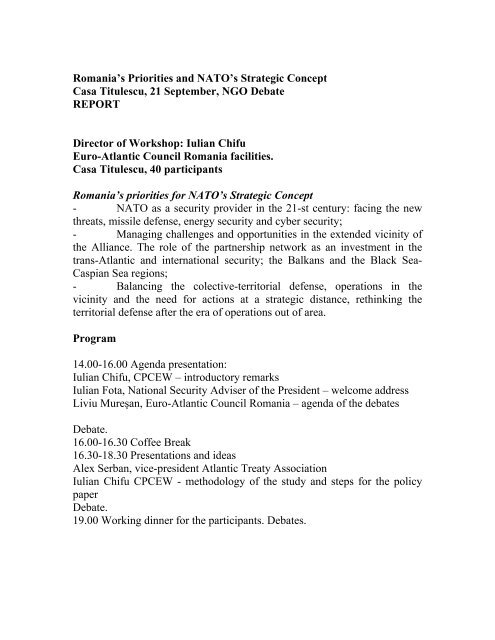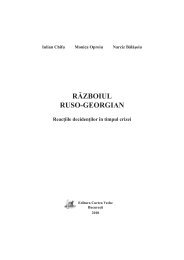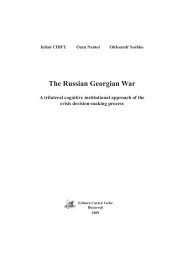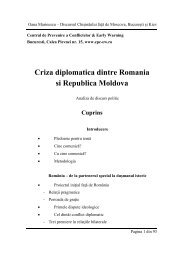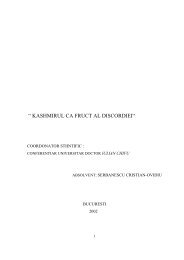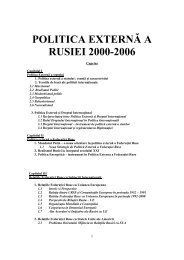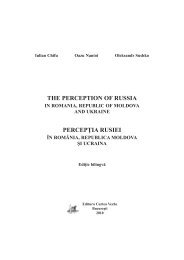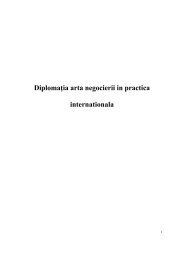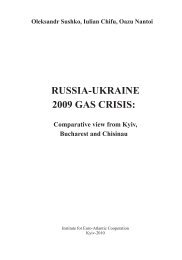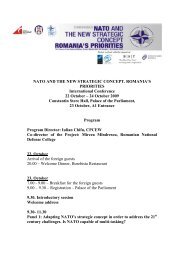view report - Centrul pentru Prevenirea Conflictelor
view report - Centrul pentru Prevenirea Conflictelor
view report - Centrul pentru Prevenirea Conflictelor
You also want an ePaper? Increase the reach of your titles
YUMPU automatically turns print PDFs into web optimized ePapers that Google loves.
Romania’s Priorities and NATO’s Strategic Concept<br />
Casa Titulescu, 21 September, NGO Debate<br />
REPORT<br />
Director of Workshop: Iulian Chifu<br />
Euro-Atlantic Council Romania facilities.<br />
Casa Titulescu, 40 participants<br />
Romania’s priorities for NATO’s Strategic Concept<br />
- NATO as a security provider in the 21-st century: facing the new<br />
threats, missile defense, energy security and cyber security;<br />
- Managing challenges and opportunities in the extended vicinity of<br />
the Alliance. The role of the partnership network as an investment in the<br />
trans-Atlantic and international security; the Balkans and the Black Sea-<br />
Caspian Sea regions;<br />
- Balancing the colective-territorial defense, operations in the<br />
vicinity and the need for actions at a strategic distance, rethinking the<br />
territorial defense after the era of operations out of area.<br />
Program<br />
14.00-16.00 Agenda presentation:<br />
Iulian Chifu, CPCEW – introductory remarks<br />
Iulian Fota, National Security Adviser of the President – welcome address<br />
Liviu Mureşan, Euro-Atlantic Council Romania – agenda of the debates<br />
Debate.<br />
16.00-16.30 Coffee Break<br />
16.30-18.30 Presentations and ideas<br />
Alex Serban, vice-president Atlantic Treaty Association<br />
Iulian Chifu CPCEW - methodology of the study and steps for the policy<br />
paper<br />
Debate.<br />
19.00 Working dinner for the participants. Debates.
Debate <strong>report</strong><br />
The debate “Romania’s priorities and the NATO Strategic Concept”<br />
represents a first step in a series of events with the purpose of defining<br />
Romania’s position inside NATO, and to bring a contribution, through the<br />
results of debates held by a group of experts, to establishing a New Strategic<br />
Concept of the North Atlantic Alliance.<br />
The Strategic Concept represents the second most important document after<br />
the Washington Treaty because it guides the activities of the Alliance<br />
regarding the goals and threats, so it needs to benefit of a wider debate.<br />
The Strategic Concept is seen as one with substance, in which balance<br />
should be the defining element. The clarification of the relations with Russia<br />
and a precise determination of the place and role of the new NATO – Russia<br />
partnership will have consequences on the EU – Russia relation, etc. The<br />
New Strategic Concept must find a solution for the situation in which the<br />
relations between the NATO member states can slow EU integration, such<br />
as the case of Turkey and Cyprus, and can have repercussions for the<br />
Alliance.<br />
The New Strategic Concept has to clarify the future relations with Russia,<br />
Even though Russia seems to be in a relative decline (negative demographic<br />
trend and low technological performance, problems with keeping in Russia’s<br />
sphere of influence states with historic bonds). The quality of the partnership<br />
with Russia can represent a contribution to Europe’s stability and security,<br />
including energy security.<br />
Article 5 represents a key problem and must be analyzed according to the<br />
new international context, one dominated by the world economic crisis, with<br />
costs for the Alliance and its member states.<br />
The new international context encourages the implementation of a new<br />
Strategic Concept: changes at the White House and in the US new<br />
administration; the need for a dialogue with the states that challenge the<br />
rules of the Alliance (Russia) and with the ones with growing influence<br />
(China); putting in question the Western influence in the states placed<br />
geographically between NATO’s borders and Russia’s; the relation with the<br />
Muslim world; Iranian case etc.<br />
From the perspective of the interdependence between the major actors, US-<br />
Russia and US-NATO relations await for the new decisions of the US<br />
administration. In the NATO-UE relation it is expected a mutual evaluation<br />
in order to determine the compatibility of approaches, and regarding the<br />
NATO-Russia-EU triangle they expect the answers at Russia’s requests and<br />
the relevance of NATO’s proposal for Russia.
NATO is considered an expression of the Western security, a body which<br />
feels the need to cooperate and form new partnerships with the other<br />
international players, an organization who needs a common political <strong>view</strong><br />
about the future roles of the major actors.<br />
There is the issue of avoiding a local/regional NATO, focused on Europe, on<br />
parts of it or of the Alliance, and of a global NATO, focused on the major<br />
emerging powers. It’s recalled the fact that a growth in domestic instability<br />
can have an impact over the regional security as it is the case for Central<br />
Asia and Sub-Saharan Africa.<br />
In what concerns the partnerships, it is important the way in which the<br />
Alliance will conceive its relations with the partners, including the<br />
governmental organizations, as well as non-governmental and local actors.<br />
The participants underlined the need for EU-NATO cooperation, drawing<br />
attention over the fact that states with problems, such as Romania, can<br />
represent “the weak link” of EU’s and even NATO’s (political instability,<br />
corruption, lack of economical performance, incoherence in foreign policy).<br />
From the same perspective, the weak performance of the Romania-EU<br />
relations can face the possibility of losing the representation in the EU and<br />
NATO.<br />
Regarding the Romania-Russia relations, Russia can become a partner if<br />
there are signs that could indicate a change of its attitude.<br />
In the Romania-NATO relation, article 5 has a great importance, especially<br />
after the august 2008 experience with Georgia. There were suggestions to<br />
keep the present content of the Concept and final summit declarations, as<br />
well as the flexibility through the development of the idea of defense, cyber<br />
defense and protection of critical infrastructure.<br />
As far as the Afghanistan issue is concerned, the attention falls on the need<br />
of a common military perspective, as well as of a civilian approach.<br />
Afghanistan must be engaged in a regional context, using an integrated<br />
strategy, which combines security, government, rule of law and economic<br />
development, at the same time with the development of this country’s<br />
capability to assume responsibility for its own destiny.<br />
The New Strategic Concept should take into consideration, first of all the<br />
need to provide security for civilians, not only for states ( the 9/11, Madrid,<br />
London cases), as well as the challenge of finding the proper formula for a<br />
dialogue with the Muslim world, without neglecting the new security<br />
problems such as the one in the space area.<br />
As an invitation to future debates, here are a series of questions to which the<br />
New Strategic Concept should come with an answer:<br />
- What kind of security environment will be in 2030
- How relevant will be the present NATO after two decades<br />
- How relevant will be the present EU after two decades<br />
- From a transatlantic NATO to a global NATO<br />
- From a post cold war NATO to a NATO as an answer to global<br />
warming<br />
- Which are Romania’s expectations towards NATO in the next two<br />
decades<br />
- Which are NATO’s expectations from Romania in the next two<br />
decades<br />
- Which is the definition of the Strategic Concept for Romania in the<br />
next 10 – 20 years, taking into consideration that security becomes a<br />
more and more complex issue<br />
- Which are the possible threats for Romania Natural disasters<br />
Demography Etc.<br />
The consequences of canceling the anti missile shield and its implications on<br />
the Black Sea security were also topics in the debate.<br />
Ideas and statements<br />
Iulian Fota<br />
- The strategic concept lays down NATO’s direction and offers information<br />
about threats and risks that require solving. We need a strategic concept that<br />
does not avoid existing realities. A new strategic concept is a prerequisite for<br />
a new international context. Some experts claim that, with Russia’s attack on<br />
Georgia and the economic crisis, a new stage has emerged, shifts have<br />
occurred in the international system. Still, Russia is not of the same opinion.<br />
If in the past terrorism took precedence over other threats outlined in the<br />
strategic concept, nowadays, it ranks second, if not third.<br />
- Romania is uncomfortable with the notion of West, is unable to regard<br />
itself as part of the West, even though after the EU accession it is part of it.<br />
Even when Russia makes references, it talks about Europe and Romania.<br />
NATO is the expression of the Western World’s need for security. In<br />
Foreign Affairs, Brzezinski raises the question of whether NATO will be the<br />
organization that the West needs.<br />
- It remains still unclear how the new US administration regards<br />
international relations, new developments in the Iranian dossier and the<br />
relation with Russia. The new strategic concept must be defined by the US<br />
in accordance with NATO’s agenda. Article 5 should provide a definition of<br />
the role NATO should assume in Western Europe. But in order to shed some
light on the realities of the international arena, we must compel Russia to<br />
disclose its own game.<br />
- One of the measures that ought to stand at the core of the new strategic<br />
concept is related to the reconfirmation of Article 5. Realistically speaking,<br />
the issue of balance is very important, collective defense, the balance<br />
between common threats and European threats, the balance between<br />
geographical regions (why the states surrounding the Adriatic Sea are<br />
granted more importance than the ones around the Black Sea).<br />
- Relations within the Alliance are just as significant for its strategic concept.<br />
For instance, NATO’s relation with Germany has raised many questions,<br />
but, even more unexpected was France’s decision to return to NATO<br />
military structures.<br />
- There are two divergent opinions when Europeans try finding a workable<br />
European formula in terms of security. The European Right regards Russia<br />
as an important state while the European Left considers they should maintain<br />
relations with the US without spoiling the relation with Russia. To conclude,<br />
Russia’s role is not yet clarified as there is no unitary <strong>view</strong>, which is also<br />
caused by a not so hopeful prediction about Russia’s future considering the<br />
demographic and economic plunge and absence of a soft policy towards the<br />
states within its sphere of influence. The US accepts some of Russia’s<br />
claims, but, when the latter asks for too much, the US opposes. The West’s<br />
stand is to accept a prospective Russian accession to NATO, since that<br />
would solve security matters between the two and generate a higher degree<br />
of overall security.<br />
- As far as the relation between Romania and Russia is concerned, it has<br />
become clear that Romania should adopt a tougher stand towards Russia<br />
which would ensure a stronger partnership between the two than a flexible<br />
stand would.<br />
Liviu Mureşanu<br />
NATO in the context of change<br />
Opinions from Karsten Voigt<br />
Topics on which NATO must adapt to the transformation of the international<br />
scene:<br />
-cooperation<br />
-vision over a common course of action<br />
-new partnerships<br />
-global power (USA) vs. global value/ aspiration/ideal (EU)<br />
-EU-NATO cooperation
-partnership with Russia<br />
-common perspectives in Afghanistan<br />
-strategic consensus<br />
-human security<br />
-relationship with the Muslim world<br />
-new types of war<br />
-domestic instability<br />
- The partnership with Russia, cooperation with Russia enhances the<br />
stability and security for Europe as a whole.<br />
- Human security is NATO’s new priority, a European concept adopted<br />
by NATO in order to go beyond state security towards individual<br />
security.<br />
Sergiu Celac<br />
The new strategic concept should be based on:<br />
1. strengthening the application of Article 5<br />
2. Concern for a contribution on agency’s forum and priorities.<br />
3. Energy security. This confronts with infrastructure security idea that can<br />
be solved by the viability of the Energy Charter. Medvedev reconfigured<br />
trough the energy policies the global energy strategy.<br />
In what Romania's energy security is concerned, it would be useful to have<br />
backup plans for the energy sector, including nuclear power.<br />
The energy sector is a weak area of the economic, industrial transactions.<br />
Energy security is an unresolved point between the EU and Russia.<br />
Last week on the Valdai Discussion Club, experts presented a parallel<br />
between Russian interests and the interests of the United States from the<br />
Russian perspective that denote future policy lines of Russia, but also their<br />
strategic lines.<br />
EU is a weak player in terms of energy security, and this pleases Russia<br />
because it is easier to work, cooperate with separate parts than with the<br />
common interests of countries.<br />
From this presentation it is clear that Russia did not want to make it a<br />
tactical move, but was an honest opinion, because the EU hasn’t got a<br />
chance to become stronger.<br />
Iulian Chifu<br />
What does NATO want to become
An universal toolbox or an alliance that has some objectives and has to<br />
pursue them To create the new NATO’ strategic concept we must have a<br />
version of flexibility which contains:<br />
- Expansion, and access to the issue of Article 5, and in addition to that the<br />
optional use of it, two months would pass before a validated reaction.<br />
- The wording of Article 5 plus extending the strategic concept’s adaptation<br />
of cyber defense.<br />
The conflicts between countries that have hampered their integration in the<br />
EU as was the case of Turkey and Cyprus could have repercussions in<br />
NATO.<br />
NATO approach to solving problems by military means, which in fact could<br />
be resolved diplomatically.<br />
Ambasador Ecobescu<br />
He offered the counter of the NATO’s weaknesses by setting up a list of<br />
main points and priorities that must be pursued to reach their<br />
implementation.<br />
Iulian Fota<br />
Romania’s relationship with Russia isn’t vital, while the relationship with<br />
U.S. is very important.<br />
What is the comfort that Romania has as a NATO member<br />
How would it have been if Romania wasn’t a NATO country<br />
What is the prospect of Romania in NATO over 15 years<br />
How will Romania follow its interests in the new strategic concept<br />
Romania’s closeness to Russia isn’t favorable. Most wars have had of the<br />
cause of the fight for market reasons. What place is there for any interest for<br />
market monopoly as long as there are no investments with a real strategic<br />
interest<br />
For Russia to keep their current position, it must create as many problems to<br />
be noticed. It’s better for us to join the Russians in projects, partnerships,<br />
organizations because they bring Europe safety, grace to the lack of tensions<br />
in the relations in this area.<br />
NATO has as new priorities - cyber defense and energy security which<br />
represent the interest and the need to adopt a new NATO’ strategic concept.<br />
NATO talks about common defense, not security. A new re-approach of<br />
NATO’s concept. A defense must be understood not only as military<br />
defense.<br />
Sergiu Celac
Russia and China want to transform the Shanghai Cooperation Organization<br />
in an Asian NATO, to limit, stop NATO’s power in Asia. It is therefore<br />
desirable for both to have a permanent collaboration.<br />
Aurel Preda<br />
Europe must decide for itself when it comes to security, and NATO to come<br />
to another level.<br />
What follows the new anti-missile system in the relationship between the<br />
U.S. and Russia<br />
Conclusions<br />
There are questions if Turkey and Russia will become NATO members, if<br />
NATO will exist anymore, but what are scenarios for NATO in 2030<br />
Participants, 21 septembrie 2009<br />
1. Doru Frunzulică - Preşedinte Asociaţia “George C. Marshall”<br />
Romania<br />
2. Alexandru Şerban-Vicepresedinte ATA /Atlantic Treaty Association<br />
3. Gen. (r) Nicolae Spiroiu- Director Executiv, Consiliul Euro-Atlantic<br />
Romania<br />
4. Sorin Encuţescu - Preşedinte, Asociaţia Manfred Worner, membru<br />
fondator CEAR<br />
5. Răzvan Ionescu, preşedinte Asociaţia <strong>pentru</strong> Cooperare si Securitate<br />
Regională “ALIANŢA”<br />
6. Constantin Dudu Ionescu, preşedinte Fundaţia IDEA<br />
7. Lavinia Andrei<br />
8. Dorel Sandor<br />
9. Radu Tudor<br />
10. Sever Voinescu<br />
11. Sandra Prolong, preşedinte Synergetica<br />
12. Viorel Mircescu, director Executiv, <strong>Centrul</strong> de Asistenţa <strong>pentru</strong><br />
Organizaţii Neguvernamentale<br />
13. Radu Filipescu, preşedintele Consiliului de Administratie, Grupul<br />
<strong>pentru</strong> Dialog Social<br />
14. Cristian Pârvulescu, preşedinte, Asociaţia Pro Democraţia<br />
15. Mircea Toma, director Agenţia de Monitorizare a Presei – Academia<br />
Caţavencu
16. Ioana Avădani, director executiv, <strong>Centrul</strong> <strong>pentru</strong> Jurnalism<br />
Independent<br />
17. Ilona Mihaieş, preşedinte Fundaţia <strong>pentru</strong> o Societate Deschisă<br />
18. Alina Inayeh, director, German Marshall Fund Romania<br />
19. Stelian Arion Vicepresedinte ARTS<br />
20. Mircea Botescu Conf. Dr.Universitatea Bucuresti<br />
21. Iulian Chifu Director <strong>Centrul</strong> de Prevenire a <strong>Conflictelor</strong> si Early<br />
Warning<br />
22. Septimiu Caceu Director Homeland Security Center - EURISC<br />
23. Teodor Minodor Chirica Director General AMEC NUCLEAR RO<br />
24. Constantin Ciupagea Director IEM<br />
25. Iulian Fota Consilier Prezidential Administratia Prezidentiala<br />
26. Dumitru Mihu Director Proiecte Fundatia EURISC<br />
27. Mihai Moia Secretar General Fundatia EURISC<br />
28. Ing. Doina Nitu<br />
29. Mihail Orzeata Senior Research Fellow Fundatia EURISC<br />
30. Dorin Prunariu Presedinte Consiliul Agentiei Spatiale Romane<br />
31. Catrinel Reed Tibacu Cercetator Fundatia EURISC<br />
32. Teodor Repciuc Profesor Univ. Dr. Universitatea Ecologica<br />
33. Stefan Roseanu Senior Partner Clubul Feroviar<br />
34. Adrian Vâlciu Doctorand, Universitatea Politehnica, Bucuresti<br />
35. Rasvan Roceanu, Asociatia Absolventilor IHEDN<br />
36. Gen.(r) Mihaiu Margarit, Vicepresedinte, Asociatia Ofiterilor in<br />
Rezerva din Romania<br />
37. Ciprian Dediu, Fundatia EURISC<br />
38. Ambasador Nicolae Ecobescu<br />
39. Ambasador Nicolae Micu<br />
40. Vasile Candea, Presedinte Academia Oamenilor de Stiinta din<br />
Romania<br />
41. Ambasador Sergiu Celac, Senior Advisor, <strong>Centrul</strong> National <strong>pentru</strong><br />
Dezvoltare Durabila<br />
42. Florin Pogonaru, Vicepresedinte Aspen<br />
43. Vasile Ciulava<br />
44. Ion Nitu<br />
45. Radu Dop<br />
46. Catalin Andronic


